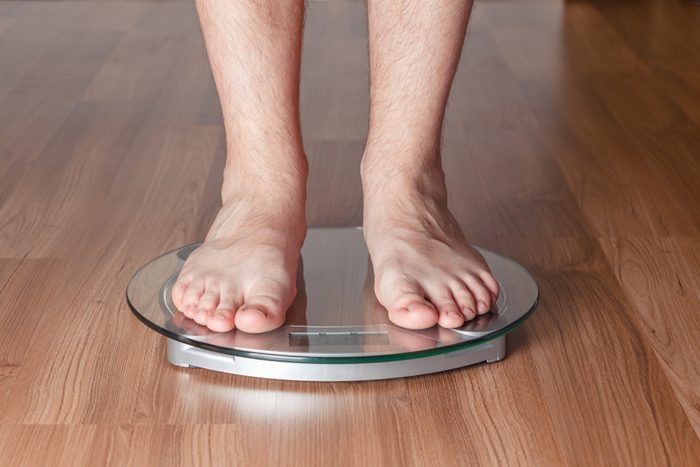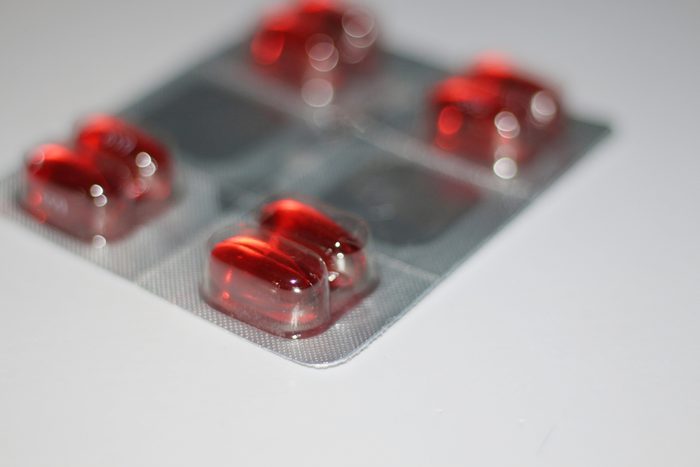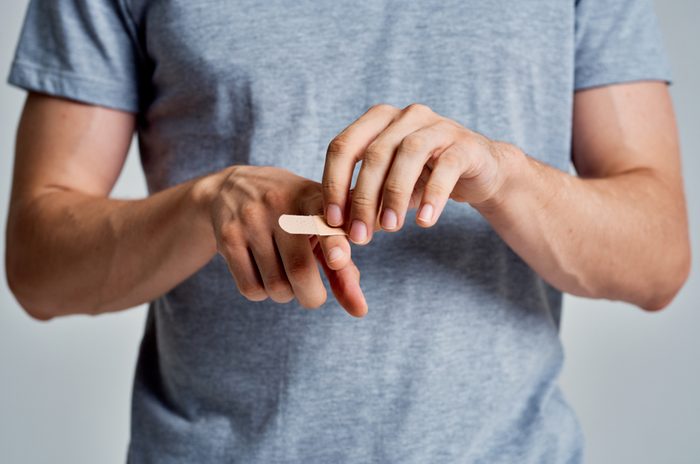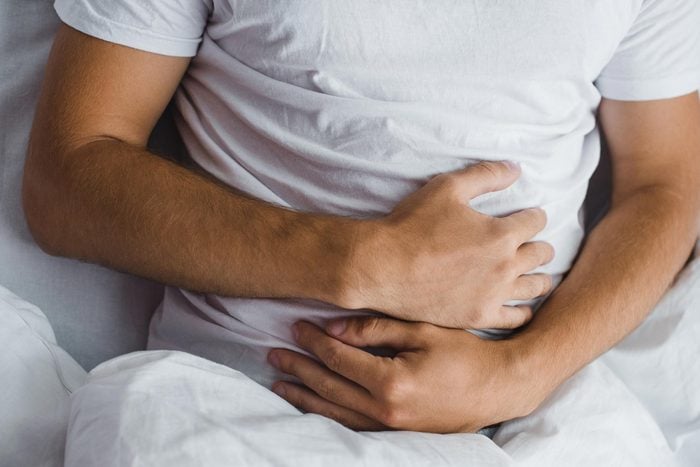
The mystery—and agony—of gastritis
If your stomach is burning or aching, you may have gastritis, which is inflammation of the stomach lining, says Taruna Bhatia, MD, a gastroenterologist with Kaiser Permanente in Southern California. The only way to know for sure is with an endoscopy: A specialist snakes a tube down your digestive tract to your stomach to assess the situation. Doctors then biopsy the lining of your stomach. If you’re having persistent issues with your stomach, you’ll want to make an appointment with your gastroenterologist and get scoped. (If you’re experiencing pain on the left side of your abdomen, here’s what it could mean.) Meanwhile, here are some signs of gastritis you should know about.
You often feel bloated
There are dozens of reasons why the stomach bloats, and most of the time it’s completely normal. However, if it happens frequently, or after most meals, you may want to explore causes with your doctor. While gastritis can cause bloating, there may be other underlying causes, such as the more common dyspepsia, which is basic indigestion.
“Everyone has dyspepsia from time to time, whereas gastritis—which is what everyone says they have—is only diagnosed with a biopsy of the inside of your stomach,” says David Greenwald, MD, professor of medicine and gastroenterology at the Icahn School of Medicine at Mount Sinai and director of clinical gastroenterology and endoscopy at Mount Sinai Hospital in New York City. “Common signs of gastritis include recurrent upset stomach or frequent nausea, abdominal pain, and a burning sensation in the upper abdomen or lower chest. Sometimes people with gastritis are bothered by a loss of appetite or hiccups. In the most severe cases of gastritis, you’ll see blood in the stool.”

You burp a lot
Infection with the bacteria Helicobacter pylori (H. pylori) is one of the most common causes of gastritis, says Elena A. Ivanina, DO, a gastroenterologist with Lenox Hill Hospital in New York City. “It is an infection that can escape stomach acid and release toxins that damage the stomach.” The change in enzyme activity of the inner [stomach] lining can give symptoms of belching, which may seem like just a minor inconvenience. However, a review of studies, published in the journal Gastroenterology, found that H. pylori, which infects more than half of the world’s population, can cause cancer if it’s not treated. Like bloating, burping rarely occurs alone when it is caused by gastritis, says Dr. Ivanina. A breath test can check for H. pylori.

You feel full, even after a small meal
Another side effect of H. pylori is feeling uncomfortably full in the upper part of the stomach after eating even a small meal or too soon during a meal. “The irritation of the stomach lining can affect the normal function of the stomach,” says Dr. Ivanina. This condition—called early satiety—can also result from an ulcer, a blockage in your digestive tract, a tumor, or heartburn.

You have a vitamin B12 deficiency
You get B12—essential for keeping your body healthy and your energy levels high—from fish, meat, poultry, dairy, and eggs. An H. pylori infection can inhibit your body’s ability to break down the protein that’s needed to absorb B12 from food. A B12 deficiency can cause what’s known as autoimmune gastritis, a chronic inflammatory disease that destroys cells in the stomach lining that are involved in vitamin B12 absorption, says Dr. Greenwald. “B12 is an important vitamin for allowing many normal body functions to go on. Other signs of B12 deficiency include a loss of balance and coordination.” A vitamin B12 deficiency can also lead to pernicious anemia, which is treated with vitamin supplements. There are other factors that can cause your B12 levels to drop. Learn 13 sneaky causes of B12 deficiency.

You have inflammatory bowel disease
People who struggle with inflammatory bowel diseases such as Crohn’s are at a higher risk of gastritis. “If you have Crohn’s disease, it may affect your stomach as it has the potential to affect the entire GI tract,” says Dr. Ivanina. Crohn’s disease usually strikes the end of the small bowel and the start of the colon but it can affect anywhere from the mouth to the anus. Other symptoms of Crohn’s include chronic diarrhea, constipation, abdominal cramping, feeling like you haven’t completely emptied your bowels, and rectal bleeding.

You are losing weight
A review of studies, published in the World Journal of Gastroenterology, suggests you can contract H. pylori by eating contaminated food or drinking contaminated water. Once the bacteria has entered your system, it inhabits your stomach lining and stays there, says Dr. Bhatia. “Some patients are unable to eat due to the discomfort and, hence, lose weight.” She says it’s important to treat this infection right away, not only for immediate relief but, more importantly, to eliminate the chance of developing stomach cancer over time. Doctors can treat H. pylori with antibiotics.

You feel nauseated
Along with belching and bloating, H. pylori infection can also cause nausea. Dr. Bhatia says that the movement of bile—a digestive liquid produced by the liver—from the small intestines into the stomach may be the source of nausea or vomiting. (Bile reflux is, in fact, a type of gastritis, according to a study published in Clinical Gastroenterology and Hepatology.) However, nausea can also be a symptom of many other conditions including indigestion, so it’s important to take that into consideration before assuming you have an H. pylori infection.

You drink alcohol or take certain drugs
H. pylori infection is not the only way people develop gastritis. There are a handful of other culprits—including alcohol or cocaine abuse, says Dr. Greenwald. “Extreme or significant alcohol consumption irritates the lining of the stomach.” This could take the form of stomachaches or heartburn after you drink. If it goes on, you might end up with ulcers. The most obvious way to prevent this problem is to stop drinking alcohol or cut back on how much you drink.

You use a lot of anti-inflammatory drugs
Some pain meds can ease pain in a hurry, but they also can be hard on your tummy. Used excessively, nonsteroidal anti-inflammatory drugs (NSAIDs) such as Motrin and Advil (both of which contain ibuprofen) and Aleve (active ingredient: naproxen) can, ironically, inflame the stomach lining and lead to gastritis, says Dr. Bhatia. A study published in Australian Prescriber found that NSAIDs can even cause peptic ulcers, which are open sores that form in both the internal part of the stomach lining and the upper portion of the small intestine. Know the 10 signs of an ulcer you should never ignore.

You smoke cigarettes
Everybody knows smoking is bad. Just how bad is it? More than 16 million Americans have a smoking-related disease, according to the Centers for Disease Control and Prevention (CDC). Smoking tobacco increases the likelihood of developing gastritis because of the multiple ways it damages your stomach lining, says Dr. Bhatia. It can reduce the production of the protective mucus in the stomach. A nicotine habit also seems to boost the production of pepsin, a stomach enzyme that breaks down protein—and that also can lead to stomach inflammation. “Smoking can also slow the blood supply to the stomach lining and reduce healing from inflammation or ulcers,” says Dr. Bhatia. Need help getting started? Here are the 22 best ways to quit smoking.

You have anemia
People over 40 who have symptoms of indigestion and anemia, such as fatigue, should see a gastroenterologist about getting an upper-gastrointestinal endoscopy done, says Dr. Bhatia. The anemia may be caused by erosive gastritis, a rare type of gastritis that causes ulcers to develop in the stomach lining and can lead to bleeding; the blood loss from stomach damage could be the source of your anemia. Other symptoms of erosive gastritis include nausea and vomiting, decreased appetite, weakness, and a burning feeling in the stomach.

You’re experiencing intestinal bleeding
The key indicators of intestinal bleeding are blood in your stool or vomit. Other, less obvious symptoms may include stomach cramps, shortness of breath, and weakness. Whatever the symptom, the cause could be gastritis or, specifically, ulcers resulting from gastritis. Other reasons for bleeding include tumors (both benign and cancerous), colitis, polyps in your colon, diverticular disease, hemorrhoids, and ulcers. If you see evidence of blood, Dr. Bhatia recommends getting an endoscopy immediately.

You have stomach cramps
Stomach cramps are just one of the many “nonspecific” symptoms of gastritis, according to Dr. Ivanina. That means the symptom could have many different causes. The stomach pain associated with gastritis can range from mild to severe and can also come and go, although doctors aren’t sure why. Whatever the severity or frequency, the pain tends to concentrate in the mid-upper stomach above your belly button but below your breastbone. Like the other symptoms of gastritis, stomach cramps can be a significant drain on quality of life–all the more reason to seek help.
